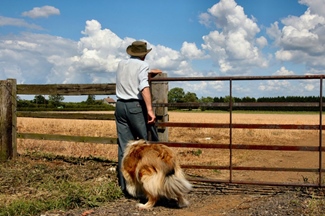 Farmers face unique estate planning issues separate from more traditional white-collar careers. The nature and value of assets in a farm presents different estate planning issues for hard working farmers. Because an orderly disposition of farm assets may take years, it is important for farmers to plan early for their retirement.
Farmers face unique estate planning issues separate from more traditional white-collar careers. The nature and value of assets in a farm presents different estate planning issues for hard working farmers. Because an orderly disposition of farm assets may take years, it is important for farmers to plan early for their retirement.
Estate Planning For Minnesota Farmers
The University of Minnesota Extension classifies farm assets in three different categories. Current assets include crops, both stored and planted. (Gary A. Hachfeld et. al, Preparing to Transfer the Farm Business, Transferring the Farm Series #1 (2016). These mirror traditional balance sheet assets in that the farmer can expect to use these assets within a year. Livestock and machinery typically comprise intermediate assets. Id. Furthermore, buildings and land are longer terms assets common to a farm. Id. It is important that a farmer account for all assets and their expected useful lives when considering creating a farm estate.
Charitable Remainder Trusts
There are effective estate planning vehicles farmers may use to devise their assets in an orderly fashion. One common method is to use Charitable Remainder Trusts (CRT). CRTs are a hybrid estate-planning vehicle that devise interests in farm estates to designated beneficiaries first and then to charities. (Lori A. Peterson, Charitable Remainder Trust In-Depth for Farmers Part I & II, 42nd Ann. Prob. & Trust L. Sect. Conf. (2016). Contributions to a CRT offer farmers an income stream similar to an annuity and potential avoidance of a self-employment tax. Gary A. Hachfeld et. al, Transferring Machinery and Livestock, Transferring the Farm Series #1, (2016). Setting up a CRT to realize the full value of CRTs is a complex and involved process. It is important farmers considering this to consult a knowledgeable Minnesota estate planning attorney to navigate this process.
Taxes and Minnesota Farmers
Farm assets can offer another estate planning benefit farm estates. The Minnesota Qualified Small Business Property & Qualified Farm Property exclusion excludes certain farm assets from Minnesota Estate tax. According to the Minnesota Department of Revenue, qualified farm property must meet the following criteria: 1) the propertys value was included in the federal adjusted taxable estate 2) the property is agricultural in nature 3) the property was classified as agricultural land for property tax purposes and classified as 2a during the taxable year of death 4) the decedent continuously owned the property for three years preceding his or her death and, 5) a family member maintains the property for three years following the decedents death. It is important that the estate maintain homestead classification up to the point of the decedents death.
Farms are an integral part of American society and a wonderful way for parents to leave a legacy for their children or beneficiaries. However, maximizing the full value of the estate requires many hours of planning and consideration. A dedicated and intelligent Minnesota estate planning attorney can help farmers accomplish these estate-planning goals.
Free Initial Consultations
Contact the Flanders Law Firm today. I offer free consultations to all potential clients. Call (612) 424-0398.

Am looking how to Best leave small farm and assets to beneficiaries.